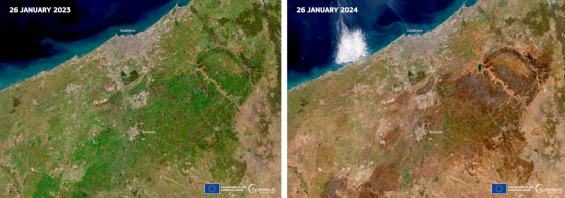Europe's EU Science Hub issued a stark report on Tuesday, highlighting six consecutive years of severe and prolonged drought events plaguing Northern Africa.
This crisis, also impacting parts of Europe for the past two years, has led to critical water shortages and hampered vegetation growth across Morocco, Algeria, Tunisia, Malta, southern Spain, and southern Italy.
Titled «Drought in the Mediterranean», the report, compiled by the EU Commission's Joint Research Center (JRC), attributes the ongoing drought to «long-lasting, above-average temperatures, warm spells, and poor precipitation».
The report ominously predicts the continuation of these hot and dry conditions, with forecasts suggesting warmer springs in Northern Africa, southern Italy, Greece, and the Mediterranean islands.
Striking before-and-after satellite images
Morocco emerges as a particularly hard-hit nation. The report reveals critically low water levels in reservoirs, with dam filling reaching a mere 23%. To illustrate the stark impact, the report juxtaposes satellite images of Casablanca taken on January 26th of 2023 and 2024.
?A new #GDO Analytical Report has just been released❗️
— Copernicus EMS (@CopernicusEMS) February 20, 2024
It provides a detailed analysis of the prolonged and severe #drought ? that has been affecting the #Mediterranean region
Read more at?https://t.co/XDQCSShzBE pic.twitter.com/Qz3BEo6WiH
The 2023 image showcases a vibrant green landscape, while the 2024 image paints a grim picture of aridity, with only scattered patches of green remaining. These images, captured by the Copernicus Emergency Management Service, provide undeniable evidence of the drought's devastation.
In response to these persisting weather patterns, Morocco has implemented water use restrictions, which will be further bolstered by seawater desalination projects to alleviate water stress.
This proactive approach aligns with the warnings issued by the UN's Intergovernmental Panel on Climate Change (IPCC), which predicts increased frequency and intensity of heatwaves and droughts in many regions, with the Mediterranean experiencing significant rainfall decline.
The report underscores the critical need for investing in early warning systems, water-efficient technologies, drought-resistant crops, and improved water access to build resilient communities in the face of this escalating climate crisis.





 chargement...
chargement...













